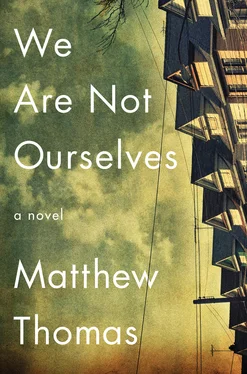She was afraid to leave him, afraid to stay. She saw him engulfed in friends’ arms and ducked into the kitchen to get him a drink. When she returned he was miming his own shock for them over and over. She didn’t want anyone else to notice the unconvincing mirth in his performance. She shouted to Connell to cue the stereo. Ed was ushered into the dining room. In the mirror she tried to look at other people’s reactions but was inexorably drawn back to her husband’s expressions. When he saw his brother Phil in from Toronto, he let out a howl that sounded like that of a dying animal. She reached for a tray of hors d’oeuvres to pass. The food smells were mingling successfully; no trace of dust came off any surface she touched; nothing was out of place. The only messes were the ones guests were making themselves — someone bumped into the punch bowl and sent a couple of crystal mugs crashing to the floor — and for those she had great patience.
She poured herself a glass of wine and drifted into the living room, where she gave herself over to conversation. Behind the timbre of any individual voice lay the lovely murmur of the group, but she couldn’t distract herself from the thought of her husband’s frenzied surprise, and she went in search of him.
She went out on the stoop with Pat and the smokers and the kids, but no one had seen him come outside. The bathroom was locked, but after a little while her aunt Margie came out. She went down to the basement and searched its recesses, where she found no sign of him.
When she got back up to the landing at her back door, instead of heading inside she called up the stairs. There was no response, but she had an instinct to proceed upstairs anyway, and she found him sitting on the flight between the second and third floors, just sitting there, looking directly at her as she approached, in a way that unnerved her, as though he’d been waiting for her to find him. The music and talking muffled through the intervening flight rose and fell in waves, following the rhythm of its own respiration. There had been no dip in the revelry yet.
“Frank wants to take your picture,” she said. “Fiona just got here. I don’t know if you saw her.”
He sat in silence, though he didn’t look away.
“Pat’s only here to see you. He doesn’t go to parties anymore. You should have heard him when I finally got him on the phone. ‘For Ed?’ he said. ‘Sure. Anything.’ ”
“Keep him away from the bar,” Ed said.
“He won’t even come inside,” she said, chuckling. “He’s on the stoop.”
She could feel her eyes watering, though she wasn’t consciously sad. “We’re having a real party downstairs,” she said. “It’d be even better if you were there.”
He patted the spot beside him. The gentleness of the gesture touched her, and being moved when she was also angry confused her, so that she wanted to go back down alone, but she gave in, gathered her skirt under her and sat.
“I’m getting old,” he said. “I can feel my body breaking down.”
“You just feel that way because it’s your birthday,” she said. “Everyone gets old.”
“I didn’t expect to see all these people. I thought we’d have a quiet night.”
She looked at him wryly. “Haven’t we had enough quiet nights lately?”
“I don’t even know half these people.”
“You know almost every single one of them,” she said. “There are maybe four people that you’ve never met.”
“Then I don’t remember them.”
“Of course you do. I’ll go around with you and start conversations and you can hear who they are that way.”
He looked away.
“You love parties,” she said. “You grumble and complain that I entertain too often, but once the party’s going, no one enjoys it more than you. Those people are here to see you. I don’t know what to tell them when they ask where you are.”
“Tell them you saw me a second ago in the other room.”
“What’s wrong with you?”
“I’m tired. I can’t tell you how tired I am. I’m tired of standing in front of a bunch of people and being the center of attention. Do you have any idea how much energy that takes? You’re never off. Never . You can never have a bad day. I feel like I’ve been trying to keep all these juggling balls in the air, and I can’t let them hit the ground or something bad will happen. I’d love to just lie down right now.”
“Well, you can’t. Everyone’s here. We have to make the best of it. I’m sorry I did this.”
“You don’t need to be sorry.”
“I am. This was a stupid idea. Stupid, stupid.”
“I just need the school year to end,” he said. “That’s it. I can’t tell you how much I’m looking forward to vacation. No summer classes for me this year, that’s for sure. I’m just going to stay put.”
Another day, she might have hissed at him to get off his ass and get down there, but something prevented her. She was about to say she’d come back and get him in five minutes when he slapped his knees and stood.
“Okay,” he said. “Let’s go.”
Before they reentered the party, she ran down to the basement to grab a bottle from the rack.
“Wave this around when we get in there,” she said. “In case anyone noticed you were gone.”
Frank McGuire had the camera around his neck and called Ed over, as relieved as a retriever reassembling the pack. She watched him arrange the guys in a row in the dining room, the group waiting for him to focus, and then a moment of stillness that seemed to expand and breathe. She tried to memorize the scene — not the visual details, which she could recall later by looking at the photograph, but the mood, the nimble camaraderie, the way they clutched each other, the hint of annoyance at having to pose, the way afterward they laughed off the brush with intimacy. Every picture of men in a row, she thought, ended as this one did, with them expelled as if by force, dispersing into separate corners to get a drink, a plate of food, to smoke a cigarette. Ed looked vulnerable standing there in the lee tide. She decided not to leave his side for the rest of the party, and ushered him around with a subtle steering of her arm. He was a perfect sailboat, responding to the slightest tug on the line, tacking when she wanted him to tack, coming about when she wanted him to come about. She could feel him relax with her there, and soon she was having fun again. She had to resist her impulse to leave him and head to where the good conversations were taking place. She’d always considered it a luxury that she could count on her husband to entertain himself at parties. From across the room they would check in with each other with a wave, a nod, a wink, and a charge of desire would run through her as she watched the way women’s eyes danced when they were near him. It was hard to see him as well up close; something was lost in the foreshortening.
Cindy Coakley brought the cake in. They sang “Happy Birthday” and Eileen put her hand on his back as he blew out the candles with a remarkable lack of wind, so that a few stray flames survived his second and even third attempts. The lights came on and Cindy passed him the knife. He stood for a moment brandishing it before him, and Eileen couldn’t help finding something menacing in the image. She put her hand over his in what she hoped would look like an evocation of the gesture of unity with which they’d cut their wedding cake, and she pressed his hand down into the thin layer of frosting and the forbidding brick of ice cream beneath it. When she released her hand he struggled to free the knife from that frozen denseness and, failing, threw up his palms in defeat and took a step back from the cake. She laughed with an expression she hoped said something universal and vague about the uselessness of men and took his face in her hands and gave him a big, unrestrained kiss. To do so in front of all those people went against every ounce of culture she’d ever absorbed. He stiffened at first, but then he relaxed and let her kiss him. People began hooting and cheering. She let him go and pulled the knife from the cake and started serving little slices.
Читать дальше
Конец ознакомительного отрывка
Купить книгу












